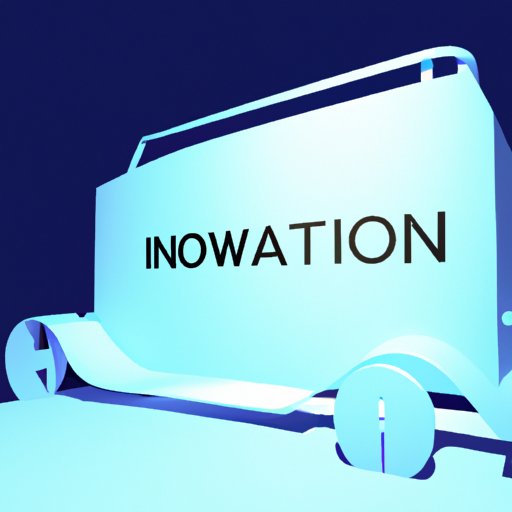Introduction
Innovation is a force that has driven humanity forward since the dawn of civilization. It has transformed the way we live, work, and interact with each other, and it continues to shape our world in profound ways. In this article, we will explore the meaning of innovation, why it is important, and its impact on society. We will also examine the historical perspective, case studies of recent and past innovations, economic importance, future outlook, and how to innovate in different fields.
Define and Discuss
Innovation is the process of creating something new or improving an existing product, service, or process that has the potential to bring value to society. It is the key to progress and growth in various fields such as technology, healthcare, and business. Innovations enable businesses to stay competitive by creating new markets and satisfying customers’ needs.
Innovation has played a crucial role in shaping some of the world’s most transformative technologies, including smartphones, electric cars, social media platforms, and cloud computing. Innovations in healthcare have led to the development of life-saving medicines, vaccines, and medical devices. Innovations in business have allowed companies to streamline their operations and offer new products and services that meet the changing needs of customers.
Examples of innovations that have changed society include the printing press, the steam engine, the telephone, and the internet. These inventions have had a significant impact on the way we communicate, access information, and do business.
Historical Perspective
Innovation has evolved over time, driven by various factors such as technological advances, social and economic changes, and political events. The industrial revolution in the 18th and 19th centuries marked a period of significant innovation in manufacturing and transportation. The 20th century saw innovations in science and technology, including the development of nuclear energy and space exploration.
Factors that have driven innovation throughout history include the need to solve problems, curiosity, and competition. Innovations have also played a decisive role in major world events, such as the two world wars and the Cold War. Radar, jet engines, and atomic bombs were innovations that played a significant role in these conflicts.
Case Studies
One recent innovation that has taken the market by storm is 3D printing. This technology allows people to print objects using a digital design. It has the potential to revolutionize manufacturing, architecture, and healthcare. Another innovation that revolutionized the music industry was the introduction of the iPod in 2001. It transformed the way people listen to music and paved the way for digital music platforms like Spotify and Apple Music.
A past innovation that transformed an industry was the Ford Model T, which was introduced in 1908. The Model T was the first car that was affordable for ordinary people, and it transformed the automobile industry. It changed the way people live and work by providing an unprecedented level of mobility.
Economic Importance
Innovation is essential to a country’s economic growth. It drives productivity and competitiveness by creating new markets and opportunities. Innovation leads to the creation of new products and services, which in turn creates new jobs and industries. It also has a positive impact on the standard of living and quality of life for people.
Investments in research and development (R&D) are critical to fostering innovation. Governments play a significant role in providing funding and incentives to individuals and companies that invest in innovation. Some countries, such as South Korea, Finland, and Israel, have invested heavily in R&D and have become innovation powerhouses.
Future Outlook
The future of innovation is exciting and holds great promise. Emerging trends in innovation and technological advances, such as artificial intelligence, big data, and biotechnology, have the potential to solve some of the world’s most pressing problems, such as climate change, poverty, and disease.
However, there are also challenges that lie ahead. Innovation can lead to job displacements, resource depletion, and environmental harm. It is important to approach innovation with a responsible and ethical mindset that considers all stakeholders.
How to Innovate
Innovation can be fostered in various fields by following a step-by-step approach. This includes identifying problems or opportunities, researching and gathering information, generating ideas, prototyping, testing, and implementing the solution. Organizations can encourage innovation by creating a culture of creativity and experimentation, providing resources and incentives, and fostering collaboration.
Tips for innovating in different fields include staying informed about trends, brainstorming with others, taking calculated risks, learning from failures, and seeking feedback from customers.
Conclusion
Innovation is the fuel that drives progress and growth in various fields. It has the power to transform society and solve global problems. As individuals and organizations, we must foster a culture of innovation and strive to find solutions that benefit all stakeholders. By doing so, we can create a better world for ourselves and future generations.
(Note: Is this article not meeting your expectations? Do you have knowledge or insights to share? Unlock new opportunities and expand your reach by joining our authors team. Click Registration to join us and share your expertise with our readers.)
